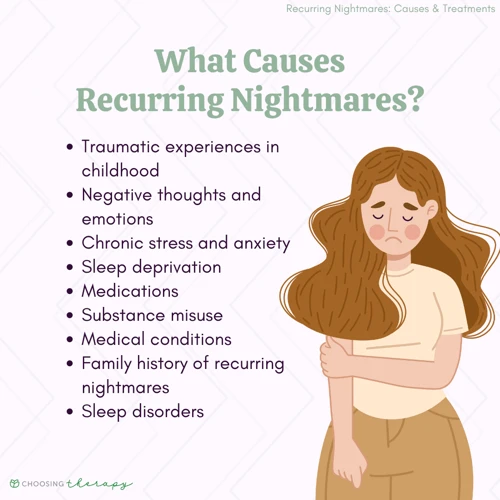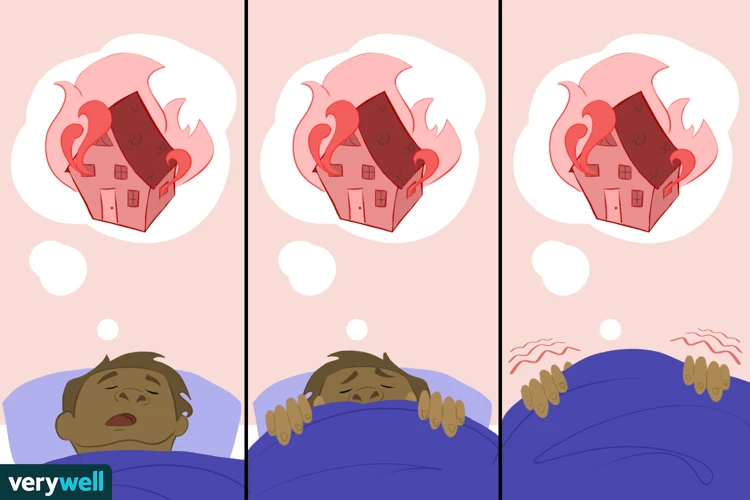The darkness of the night brings about a mysterious world of dreams and nightmares that can leave us feeling scared, helpless, and confused. While dreams can be introspective and therapeutic, recurring nightmares can have a significant impact on our mental and physical health, disrupting our sleep and leaving us exhausted and anxious. If you are someone who suffers from distressing dreams at night, you are not alone. There are many ways to tackle the issue, from relaxation techniques to medical interventions. In this guide, we will explore the science behind nightmares, identify their causes, provide tools for overcoming them, and offer tips for better sleep. Let us delve deeper into the eerie world of nightmares and discover how to ensure a peaceful and rejuvenating night’s sleep.
The Science of Nightmares

As we drift off to sleep, we descend into a world of dreams, where anything is possible. However, not all dreams are pleasant, and sometimes they take the form of nightmares. Nightmares can leave us feeling shaken and terrified, making it difficult to fall asleep again. But have you ever wondered why we have nightmares? Or how they can affect our daily lives? In this section, we’ll delve into the intriguing science behind nightmares. We’ll explore the different reasons why we experience them and how they can impact our well-being in various ways. Understanding the science behind nightmares is the first step to overcoming them.
Why Do We Have Nightmares?
Having a nightmare is a traumatic experience that can leave a person feeling shaken and disturbed. Nightmares are a common occurrence, with nearly everyone experiencing them at some point in their lives. But what causes them? There are a variety of factors that can lead to nightmares, including:
- Stress and Anxiety: Feelings of stress and anxiety are common triggers for nightmares.
- Post-Traumatic Stress Disorder: People who have experienced trauma may suffer from PTSD and have frequent nightmares.
- Illness: People who are sick or have a fever may experience more vivid and frightening dreams.
- Medications: Certain medications can lead to nightmares and vivid dreams as a side effect.
- Substance Abuse: Alcohol and drug use can cause nightmares and disrupted sleep patterns.
- Grief or Loss: People who are grieving or dealing with loss may experience nightmares related to their emotions.
- Spiritual Growth: Some people believe that nightmares can be a sign of spiritual growth or development, particularly in Eastern and Indigenous cultures.
It’s important to remember that nightmares are a natural and normal part of the sleep cycle. However, if they become frequent and disrupt daily life or cause distress, it may be time to seek help. In the next section, we will discuss how to identify the cause and triggers of recurrent nightmares. If you want to know more about the spiritual growth aspect of nightmares, you can check out this article.
When Do Nightmares Become a Problem?
Nightmares become a problem when they start interfering with a person’s ability to get a good night’s sleep or when they cause significant distress and impairment in daily life. According to a study published in the Journal of Sleep Research, approximately 35% of adults experience nightmares, and 5% to 10% of adults experience nightmares frequently to a point where it becomes a disorder. These individuals may experience disruptions in their daytime functioning, such as fatigue, difficulty concentrating, irritability, and heightened levels of anxiety.
It’s essential to note the difference between nightmares and bad dreams. While bad dreams can be unpleasant, they don’t cause severe distress and don’t usually require treatment. In contrast, nightmares are more intense dreams that can trigger severe emotional responses leading to significant sleep disturbance.
If left untreated, recurring nightmares can lead to the development of other sleep disorders like insomnia or cause clinical depression and anxiety (read more about healing traumatic nightmares). It is also essential to note that nightmares can be a symptom of underlying mental health issues, such as posttraumatic stress disorder (PTSD), anxiety, and depression.
Nightmares become a problem when they start interfering with the quality of life or causing significant distress leading to sleep disturbances and other mental health issues, which affect daily performance and functions. Thus, it becomes essential to identify the cause of nightmares and find ways of overcoming them (read more about overcoming recurring nightmares).
Identifying the Cause

Trying to overcome recurring nightmares can be a daunting task. One of the first things to do is to identify the root cause behind them. Understanding why you might be experiencing unpleasant and terrifying dreams can be key to finding effective solutions. It’s important to remember that nightmares are a common experience, and there are many resources available to help you decode their meanings. One useful approach is to start with dream journaling to uncover the symbols and patterns in your dreams. Additionally, there are specific triggers and themes that may be contributing to your nightmares, which we’ll cover in the next section.
Methods for Deciphering Your Dreams
Understanding the meaning behind your nightmares can help you identify the underlying issues that may be contributing to their recurrence. Here are some methods for deciphering your dreams:
| Method | Description |
|---|---|
| Keep a dream journal | Write down your dreams as soon as you wake up to capture as many details as possible. Look for common themes, characters, and symbols that may have significance. |
| Dream analysis | Consider seeking out the help of a therapist or counselor who specializes in dream analysis. They can help you interpret the meaning behind your dreams and identify any underlying emotional or psychological issues. |
| Talk to others | Discussing your nightmares with a trusted friend or family member may help you gain new insights and perspectives. They may also be able to offer valuable support and advice. |
| Research common meanings | There are many resources available online or in books that can help you understand the common meanings behind certain symbols or themes in dreams. Check out Common Nightmares Meanings article for some examples. |
By deciphering the meaning behind your nightmares, you can begin to take steps towards addressing the underlying issues that may be causing them. Whether it be unresolved emotional trauma or stress from daily life, understanding the root cause can be a powerful tool in overcoming recurring nightmares. If you experience more intense, physical manifestations of nightmares, such as night terrors, sleep paralysis, or waking up screaming, check out these articles for more information and understanding: Night Terrors explained and Nightmares and Sleep Paralysis: Causes and Treatment.
Common Nightmare Triggers and Themes to Look For
Identifying the common nightmare triggers and themes can be the first step in stopping recurring nightmares. Here are some common triggers and themes to look for:
| Nightmare Trigger/Theme | Description and Example |
|---|---|
| Stress and Anxiety | When you’re stressed or anxious, your mind can create fears and worries that show up in your dreams. For example, if you’re worried about a big presentation at work, you may have a nightmare about it. |
| Trauma and PTSD | If you’ve experienced a traumatic event, you may have nightmares about it. People with post-traumatic stress disorder (PTSD) often have recurring nightmares about their trauma. |
| Fears and Phobias | Having fears or phobias can cause nightmares. If you’re afraid of spiders, for example, you may have a nightmare about them. |
| Illness or Medication | Some medications or illnesses can cause nightmares. For example, people with Parkinson’s disease may experience nightmares due to the medications they take. |
| Sleep Disorders | Certain sleep disorders, such as sleep apnea or narcolepsy, can cause nightmares. If you have a sleep disorder, it’s important to seek treatment from a medical professional. |
| Food or Drink | What you eat or drink before bed can affect your dreams. For example, spicy foods or alcohol may cause nightmares. |
| Environmental Factors | Your sleeping environment can also play a role in your nightmares. If you sleep in a noisy or uncomfortable environment, it may affect your dreams. |
It’s important to remember that different people have different triggers for their nightmares. By identifying your own personal triggers and themes, you can take steps to overcome your nightmares and get better sleep.
If you want to learn more about how to cope with nightmares or other psychological issues, you can visit our article on psycho nightmares.
Tools for Overcoming Recurring Nightmares

If you are suffering from recurring nightmares, it can feel like there is no escape. However, take heart because there are tools available to help you overcome them. By adopting certain techniques and creating a positive sleep environment, you can finally put an end to those sleepless nights. In this section, we will explore several effective strategies for battling recurrent nightmares, including various relaxation techniques, dream control methods, and seeking professional help. Let’s dive in and discover how you can finally obtain a better night’s sleep.
Relaxation Techniques
One effective way to combat recurring nightmares is to practice relaxation techniques before going to bed. These can help calm your mind and promote a more restful sleep. Here are some relaxation techniques to consider:
| Technique | Description |
|---|---|
| Deep breathing exercises | Take deep breaths in through your nose and slowly exhale through your mouth. Focus on the sensation of your breath moving in and out of your body. |
| Progressive muscle relaxation | Tense and then relax each muscle group in your body, starting with your toes and moving up to your head. Hold the tension for a few seconds before releasing. |
| Visualization | Visualize a peaceful scene, such as a beach or a garden. Use all five senses to imagine yourself there, and focus on the positive sensations it brings up. |
| Meditation | Sit quietly and focus on your breath, trying to quiet your thoughts. If your mind wanders, gently redirect your attention back to your breath. |
| Aromatherapy | Use calming scents such as lavender or chamomile in the form of essential oils or candles to create a relaxing atmosphere. |
Adding a relaxation routine to your bedtime preparation can greatly improve your chances of having a peaceful night’s sleep, free from nightmares or insomnia. It is important to find the technique that works best for you and incorporate it into your nightly routine.
Lucid Dreaming and Other Dream Control Methods
Lucid dreaming is a technique that allows the dreamer to become aware that they are in a dream and take control of their own actions within it. This can be a powerful tool for overcoming recurring nightmares.
There are several methods that can be used to achieve lucid dreaming. One popular technique is called reality testing, which involves regularly checking throughout the day to see if you are in a dream or in reality. To do this, set an alarm on your phone to go off at various intervals throughout the day. When the alarm goes off, stop and ask yourself, “Am I dreaming?” Look around and try to find any inconsistencies, such as objects or people that don’t belong or an unusual environment. If you do this often enough, you may start doing it in your dreams and become aware that you are dreaming.
Another method that can be used to achieve lucid dreaming is keeping a dream journal. Every morning, write down as much as you can remember from your dreams. Over time, you may start to recognize patterns or symbols that can signal when you are dreaming. This can help you become more aware during your dreams and take control.
In addition to lucid dreaming, there are other dream control methods that can be used to overcome recurring nightmares. One technique is called imagery rehearsal therapy. This involves writing out a new, positive version of the nightmare and rehearsing it in your mind before going to sleep. By visualizing a positive outcome, you may be able to change the course of your dream and lessen the impact of the nightmare.
Finally, it’s important to create a calm and relaxing sleep environment. This can include using calming scents like lavender, ensuring that your room is dark and quiet, and avoiding electronic devices before bed. By creating a positive sleep environment and using techniques like lucid dreaming and imagery rehearsal therapy, you can take control of your nightmares and get a better night’s sleep.
| Lucid Dreaming Techniques | Other Dream Control Methods | Tips for Creating a Positive Sleep Environment |
|---|---|---|
| Reality testing | Imagery rehearsal therapy | Use calming scents |
| Keeping a dream journal | Visualizing a positive outcome | Ensure a dark and quiet room |
Talking to a Therapist or Counselor
One of the most effective ways to overcome recurring nightmares is to talk to a trained therapist or counselor. They can help you explore the underlying causes of your nightmares and develop coping mechanisms to combat them. Here are some reasons why seeking the help of a therapist or counselor can be beneficial:
- Emotional support: Therapists can provide a safe and non-judgmental space for you to discuss your nightmares and any related emotional distress.
- Identifying triggers: A therapist or counselor can help you identify any underlying triggers that may be causing your nightmares, such as past trauma or anxiety.
- Cognitive Behavioral Therapy (CBT): This type of therapy can help you change negative thought patterns and behaviors that may be contributing to your nightmares.
- Exposure therapy: A therapist may use exposure therapy to gradually expose you to situations or memories that may be causing your nightmares, helping you become less fearful over time.
- Other therapy techniques: Depending on your individual needs and circumstances, a therapist may use other techniques such as mindfulness or hypnotherapy to help alleviate your nightmares.
It is important to find a therapist or counselor who is trained in treating nightmares specifically. They can work with you to create an individualized treatment plan that fits your needs and goals. This can involve regular therapy sessions or even just a few visits to help you learn coping strategies and techniques to manage your nightmares. By seeking professional help, you can take an important step towards better sleep and improved mental health.
Medications and Other Medical Approaches
There are several medical approaches that can be used to help alleviate recurring nightmares. These options should always be discussed with a licensed medical professional before being pursued. Here are some options:
- Antidepressant Medications: Certain antidepressants are known to suppress REM sleep, which is when we have most of our dreams. By reducing REM sleep, these medications can help reduce the frequency and intensity of nightmares. However, they may also have side effects and should only be taken under a doctor’s supervision.
- Beta-Blockers: Beta-blockers are medications that are commonly used to treat high blood pressure. They have also been used to help reduce the physical arousal that can accompany nightmares. This can help reduce the overall impact of the nightmare and make it less distressing.
- Prazosin: Prazosin is a medication that is normally used to treat high blood pressure, but has been found to be effective in reducing nightmares, particularly in people with PTSD. It works by reducing the production of adrenaline, which can trigger nightmares.
- Hypnosis: Some people find that hypnosis can help reduce the frequency and intensity of nightmares. This therapy involves entering into a relaxed state and responding to suggestions made by a therapist. It can help uncover the root cause of nightmares and allow for those underlying issues to be addressed.
- Eye Movement Desensitization and Reprocessing (EMDR): EMDR is a type of therapy that has been shown to be effective in treating PTSD and related conditions. It involves a therapist leading a patient through a series of eye movements while they recall a traumatic event. This can help desensitize the patient to the event and reduce associated nightmares.
Again, it is important to consult with a medical professional before pursuing any of these options. They can help determine which approach may be the most effective and safe for each individual.
How to Create a Positive Sleep Environment
Creating a positive sleep environment can play a vital role in helping you have a good night’s rest. Here are some practical tips you can use to create a sleep-friendly environment:
| Tip | Description |
| Reduce noise | Excessive noise can disrupt your sleep pattern. Use earplugs or a white noise machine to create a quieter sleep environment. |
| Control room temperature | The ideal sleeping temperature is between 60 and 67 degrees Fahrenheit. Keep your room cool to help signal your body to sleep. |
| Eliminate light | Even small amounts of light can interfere with sleep. Use heavy curtains or blinds to block out any light from outside and turn off all screens in the bedroom. |
| Invest in a good mattress and bedding | Your bed should be comfortable and supportive. Consider purchasing a new mattress and quality bedding to make your bed a welcoming place to sleep. |
| Declutter your bedroom | A cluttered bedroom can create a restless environment. Keep the room tidy and uncluttered to promote calmness and tranquility. |
| Create a bedtime routine | Establishing a routine before bed can help signal to your brain that it’s time to sleep. This might include taking a warm bath, reading a book, or practicing some relaxation techniques. |
By implementing these tips, you can create an environment that promotes relaxation and a restful night’s sleep. Remember, a peaceful sleep environment can help you prevent nightmares and improve the quality of your sleep overall.
Tips for Better Sleep
Once you have taken the necessary steps to overcome your recurring nightmares, it’s important to focus on building a healthy sleep routine. Here are some tips for better sleep:
1. Stick to a consistent sleep schedule: Go to bed and wake up at the same time every day (even on weekends!), to help regulate your body’s internal clock.
2. Create a calming bedtime ritual: Create a relaxing routine to help you wind down, such as taking a warm bath, reading a book or listening to soft music.
3. Create a comfortable sleep environment: Make sure your bedroom is dark, quiet, and cool enough to promote sleep.
4. Invest in a good mattress and pillows: A supportive and comfortable sleeping surface can help reduce body aches and pains, as well as keep you comfortable throughout the night.
5. Limit daytime naps: While napping can be refreshing, it can disrupt nighttime sleep. If you must nap, keep it brief (no more than 30 minutes) and avoid late afternoon naps.
6. Avoid caffeine and alcohol: Stimulants like caffeine and alcohol can interfere with healthy sleep, so it’s best to avoid them in the hours leading up to bedtime.
7. Incorporate exercise into your daily routine: Regular exercise has been shown to improve sleep quality, but make sure to finish exercising at least a few hours before bedtime.
By incorporating these sleep hygiene habits into your daily routine, you can help promote a healthy sleep environment and reduce the likelihood of recurring nightmares. Sweet dreams!
Conclusion
In conclusion, recurring nightmares can be a distressing and disruptive experience, but there are many options available for overcoming them and improving the quality of your sleep. It’s important to take the time to identify the cause of your nightmares, whether it’s anxiety, trauma, or another underlying issue, and work towards addressing and resolving it.
Relaxation techniques such as meditation, deep breathing, and progressive muscle relaxation can help reduce stress and anxiety before bed, which may in turn reduce the likelihood of experiencing nightmares. Lucid dreaming and other dream control methods, such as imaginal exposure therapy or guided imagery, can also help you regain a sense of control over your dreams.
Talking to a therapist or counselor can be particularly helpful if you’re struggling with trauma or unresolved emotional issues that may be contributing to your nightmares. A mental health professional can work with you to develop coping strategies, explore your subconscious mind, and address any underlying problems that may be fueling your nightmares.
In some cases, medications or other medical approaches may be necessary to manage nightmares, particularly if they are related to an underlying medical condition or mental health issue. However, it’s important to carefully weigh the potential benefits and risks of such treatments, and to work closely with your healthcare provider to ensure that you are receiving the best possible care.
Finally, creating a positive sleep environment by establishing a regular sleep schedule, minimizing distractions in your bedroom, and investing in a comfortable mattress and pillows can help promote restful sleep and reduce the likelihood of experiencing nightmares. And don’t forget the importance of self-care – taking care of your physical and emotional well-being throughout the day can have a significant impact on the quality of your sleep at night.
Overall, overcoming recurring nightmares and improving the quality of your sleep requires a multifaceted approach that addresses both physical and emotional factors. By identifying the underlying cause of your nightmares and taking steps to address it, practicing relaxation techniques, and creating a positive sleep environment, you can find relief from your nightmares and enjoy better sleep and overall well-being.
Frequently Asked Questions
What can I do before bed to avoid nightmares?
You can try relaxation techniques such as deep breathing or meditation to calm your mind before bed.
Can certain foods cause nightmares?
Yes, certain foods such as spicy or fatty foods, caffeine, and alcohol can contribute to nightmares.
Can nightmares be a sign of a sleep disorder?
Yes, frequent nightmares can be a symptom of a sleep disorder such as sleep apnea or restless leg syndrome.
How can lucid dreaming help with nightmares?
Lucid dreaming allows you to control your dreams and can give you the power to change a nightmare into a more positive dream.
What types of therapy can be helpful for nightmares?
Cognitive-behavioral therapy or exposure therapy can be effective in reducing the frequency and intensity of nightmares.
Do over-the-counter sleep aids help with nightmares?
Some over-the-counter sleep aids may help you fall asleep, but they are not specifically designed to target nightmares.
Can exercise improve the quality of my sleep and reduce nightmares?
Yes, regular exercise can improve the quality of your sleep and reduce the frequency of nightmares.
What can I do to create a positive sleep environment?
You can create a comfortable and dark environment, use calming scents such as lavender, and eliminate any potential disruptions such as noise or light.
Can watching TV before bed cause nightmares?
Yes, watching TV before bed can stimulate your brain and increase the likelihood of nightmares.
Is there a way to prevent nightmares from coming back after they stop?
You can continue to practice relaxation techniques and other methods for better sleep to prevent nightmares from returning.








